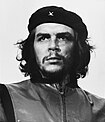Portal:Communism/Selected biography/14
Ernesto "Che" Guevara (14 June 1928 – 9 October 1967), commonly known as El Che, was an Argentine-born Marxist revolutionary, physician, author, intellectual, diplomat, military theorist and Cuban guerrilla leader. As a young man studying medicine, Guevara traveled "rough" throughout Latin America, bringing him into direct contact with the poverty in which many people lived. Through these experiences he became convinced that only revolution could remedy the region's economic inequality, leading him to study Marxism and become involved in Guatemala's social revolution under President Jacobo Arbenz Guzmán.
Some time later, Guevara became a member of Fidel Castro's paramilitary 26th of July Movement, which seized power in Cuba in 1959. After serving in various important posts in the new government and writing a number of articles and books on the theory and practice of guerrilla warfare, Guevara left Cuba in 1965 with the intention of fomenting revolutions first in the Congo-Kinshasa (later named the Democratic Republic of the Congo) and then in Bolivia, where he was captured in a CIA/ U.S. Army Special Forces-organized military operation. Guevara died at the hands of the Bolivian Army in La Higuera near Vallegrande on 9 October 1967. Participants in, and witnesses to, the events of his final hours testify that his captors executed him without trial.
After his death, Guevara became an icon of communist revolutionary movements worldwide. An Alberto Korda photograph of him entitled Guerrillero Heroico (shown) has received wide distribution and modification. The Maryland Institute College of Art called this picture "the most famous photograph in the world and a symbol of the 20th century."

